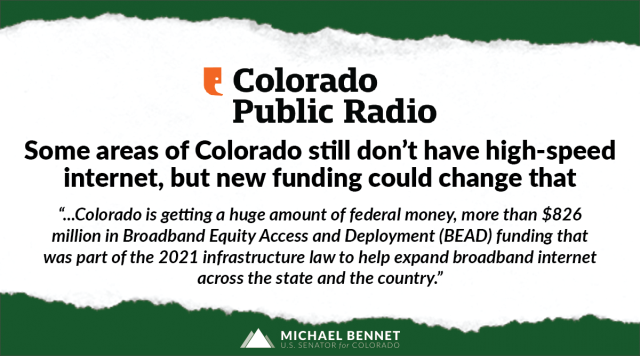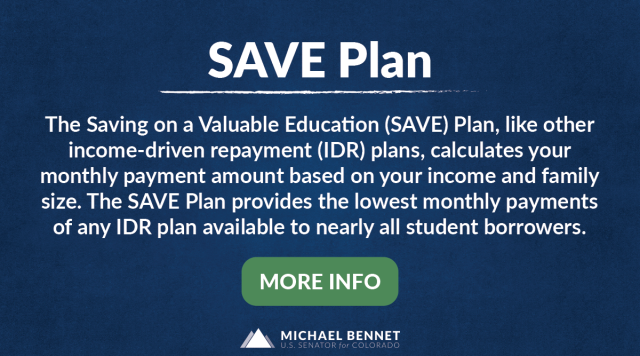|
Hello everyone,
High-speed internet is the essential infrastructure of the 21st century, but rural communities in Colorado and across the country have been left behind without access.
That's why I fought to include historic broadband funding – modeled after my BRIDGE Act – in the Bipartisan Infrastructure Law. As a result, Colorado will receive more than $826 million to connect communities in every part of the state to high-speed internet. However, there’s still more that Congress can do to ensure that rural internet connectivity programs work for Colorado.

Last month, I introduced legislation to reform a rural internet loan and grant program at the U.S. Department of Agriculture by making the permitting process more efficient and improving use for small providers. It’s time that Washington made federal programs easier to access for providers in rural areas and strengthened support for local governments, nonprofit organizations, and cooperatives that help bring internet service to rural residents.
Sincerely,
Michael

LEARN MORE ABOUT SAVING ON YOUR STUDENT LOAN PAYMENTS
What's happening: Student loan interest began again on September 1, 2023, and payments will resume on October 1, 2023. Recently, the Biden administration launched The Saving on a Valuable Education (SAVE) Plan, an income-driven repayment (IDR) plan that calculates your monthly payment amount based on your income and family size.
What this means: By calculating student loan payments based on a borrower’s income and family size as opposed to their loan balance and by forgiving remaining balances after a certain number of years, the SAVE plan will help relieve the burden of college debt for millions of borrowers across the nation, including here in Colorado. Since monthly payments are based on income, many borrowers can expect their loan payments to go down to $0 per month as they start or work through difficult moments in their careers. Learn more by visiting StudentAid.gov/SAVE.

DON'T RISK LOSING YOUR MEDICAID COVERAGE
What’s happening: Now that the COVID-19 public health emergency is over, all Coloradans enrolled in Health First Colorado (Colorado’s Medicaid program) or Child Health Plan Plus (CHP+) coverage will need to renew. Not all members will be renewed at the same time; Colorado will take 12 months (14 months including noticing) to renew members based on your annual renewal date.
What you can do if you’re enrolled in Health First Colorado and CHP+:
1. Update your contact information: Make sure Health First Colorado and CHP+ have your current mailing address, phone number, email, or other contact information.
It’s easy to update your address. Visit CO.gov/PEAK or call your county to change your contact information.
2. Check your mail, email, and PEAK mailbox and take action when you get official messages
If you get a renewal packet in the mail or an email about renewing your Health First Colorado or CHP+ coverage, fill it out, sign it and return it right away.
You can go to the Health First Colorado app and opt in to notifications that will alert you when you have a new message. You can also get notifications through your PEAK account.
You can create a free PEAK account at CO.gov/PEAK and download the free Health First Colorado app from your app store.
What if you don’t qualify for Medicaid or CHP+?
If you or a family member no longer qualify for Health First Colorado or CHP+, you may be able to buy a health plan through Connect for Health Colorado, Colorado’s official health insurance marketplace. You may qualify for financial help to lower the cost of private health insurance.
To get started and learn more about financial help, visit connectforhealthco.com or call 855- 752-6749 or TTY: 855-346-3432.
If you have questions about your enrollment status, you can locate and contact your County Department of Human Services here. More information about Medicaid renewals is available here.
Click here to respond to this email.
 
Unsubscribe |